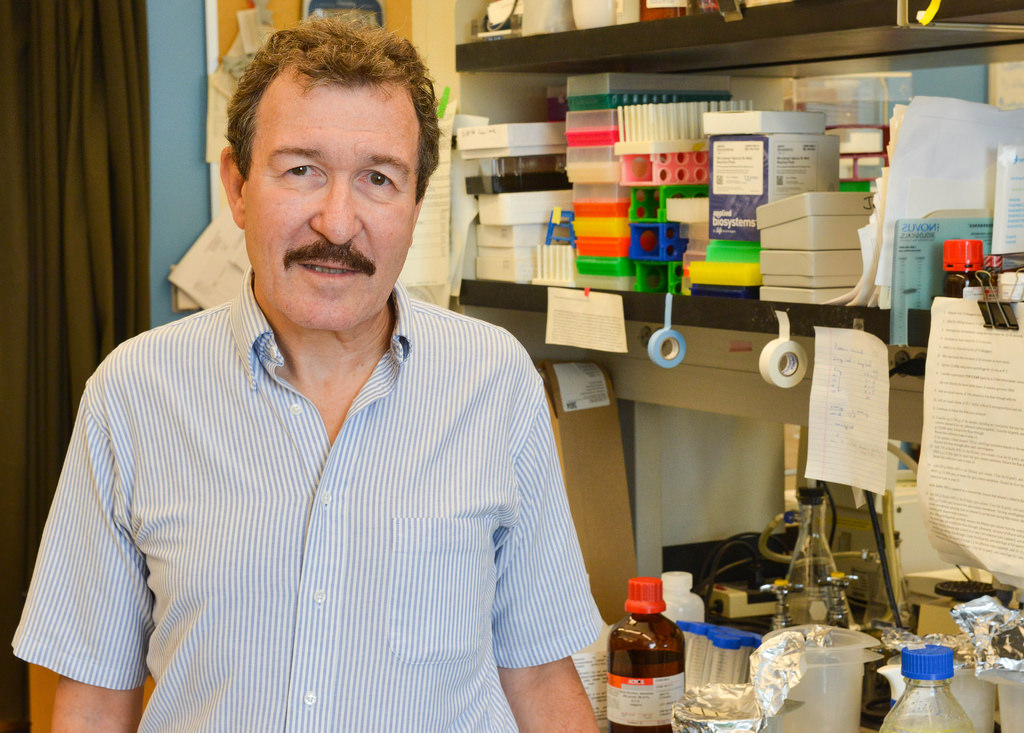Published on
Bond LSC scientist internationally recognized for work on salivary glands and autoimmune disorders
By Phillip Sitter | Bond LSC
You might not think too highly of spit, but you would quickly regret not having any.
People with Sjögren’s syndrome suffer chronic dry mouth and eyes from an overzealous immune system that attacks salivary and tear ducts, causing serious health issues.
Gary Weisman’s research might hold the key to understanding and managing this immune response, leading to effective treatment or even prevention of this ailment.
For this, the International Association of Dental Research, or IADR, awarded him the 2016 Distinguished Scientist Award for Salivary Research. Weisman accepted the award in June at the opening ceremonies of the IADR conference in Seoul, Republic of Korea.

Gary Weisman stands in his lab in Bond LSC where he studies the cellular mechanisms of auto-immune disease, specifically how the release of ATP from damaged cells signals receptors that trigger an immune response. | Phillip Sitter, Bond LSC
“We want the good, but not the bad,” said Weisman, a Bond Life Sciences Center investigator, of what we ideally want from our immune system’s functions.
Mice with un-checked autoimmune disease of their salivary glands have their glands destroyed. The disease can spread to other secretory organs next. An over-reactive immune system on a civil war-path can extend its damage to cause pancreatic failure and death.
The destruction wrought by Sjögren’s syndrome is self-inflicted, caused by an overreaction of our bodies’ defenses against infection and injury. This is what an autoimmune disease is.
But, our bodies’ immune cellular response team is complicated. Weisman said dozens of different cell types have been isolated and identified as part of the immune system, and he likens the immune system to fire, police and construction services in human society all working together.
While firefighters are meant to prevent further damage from an inferno, sometimes our bodies’ first responders start doing the equivalent of using dynamite to stop the spread of a fire.
In chronic inflammation, that autoimmune response can mean a burning, throbbing, constant pain. The key to a healthy immune response is balance. The balance has to be between containment and repair of damage caused by infection or injury and damage caused by chronic inflammation if that emergency response continues unabated.
Weisman has spent almost 30 years studying how to prevent our bodies’ immune system from over-reacting to threats and causing further harm.
Earlier in his career, Weisman studied how extracellular ATP plays a critical role in immune responses, and how too much of it can cause the over-reaction that leads to tissue destruction in autoimmune diseases. ATP, or adenosine 5’-triphosphate, is the main molecule used for energy in cellular activities inside cells. Weisman was one of the first scientists to study how damaged cells release ATP as a distress signal.
The released ATP signals receptors that “send out the alarm to the fire station” — the body’s immune cells, he said.
Once he understood this, Weisman began to manipulate the actions of released ATP to see how that would affect an immune response.
Mice with salivary gland autoimmune disease got healthy when the released ATP was prevented from activating their receptors on the surface of cells. Preventing the ATP receptors from being activated slowed down and even stopped the advance of autimmune disease.
Conversely, if you prevent the activation of the ATP receptors in lab mice with Alzheimer’s disease they die much more rapidly from the disease, Weisman said, suggesting that activation of immune cells by ATP is beneficial in slowing the progression of this disease.
Alzheimer’s disease and autoimmune diseases such as Sjögren’s syndrome are only some of the inflammatory diseases that Weisman has studied. With each of these diseases, the role of ATP receptors has to be investigated individually, suggesting that Weisman’s work may extend beyond salivary glands and the brain to other parts of the body.
“Our [ATP] receptor is also involved in heart disease,” Weisman said, and he added that other diseases like cystic fibrosis, cancer, lupus and arthritis have inflammatory components, too.
For now, we all fight a losing battle when it comes to our bodies’ management of the immune system. As we and our immune system age, it has the potential to destroy more than it protects and “eventually you could slip over to the dark side and die,” Weisman said.
In the meantime, Weisman said that a better understanding of the immune system could lead to more effective, targeted treatments of chronic inflammation and other autoimmune disorders. This could provide a new approach to control undesirable activation of the immune system beyond the use of with anti-histamines, anti-cytokines and ibuprofen.
Weisman is a Curator’s Distinguished Professor of Biochemistry. He began his salivary gland research at MU 27 years ago with Professor John Turner, before Turner’s retirement. Since then, his research has been continuously funded by the National Institutes of Health, where one of his recent grants was well scored and will likely be extended for another five years.